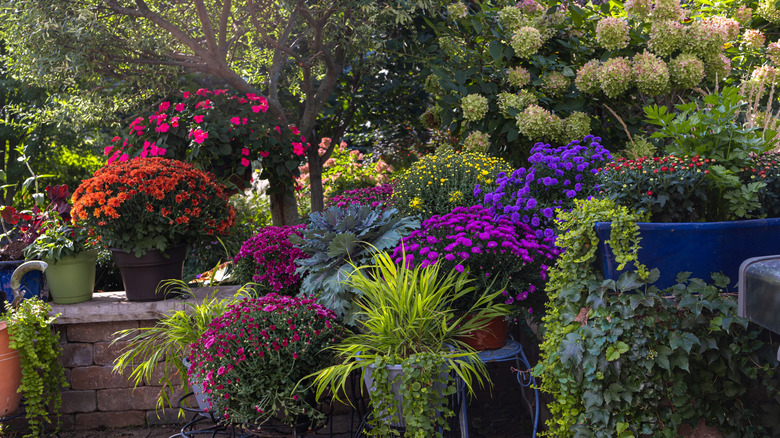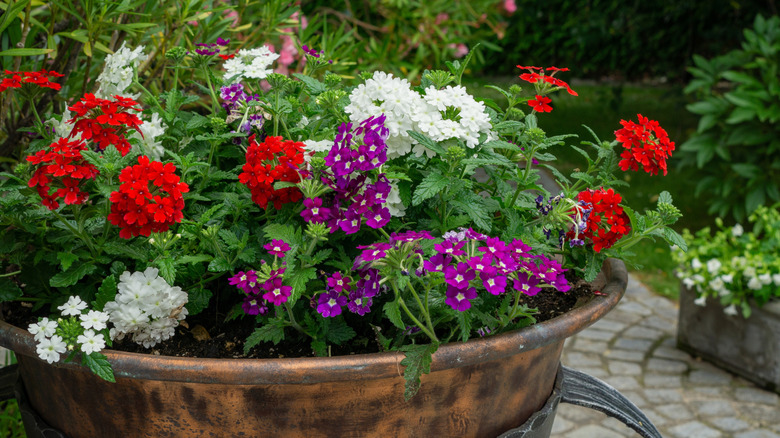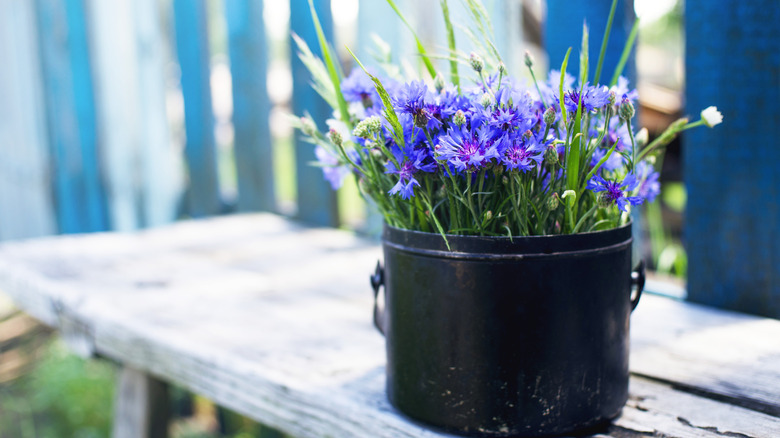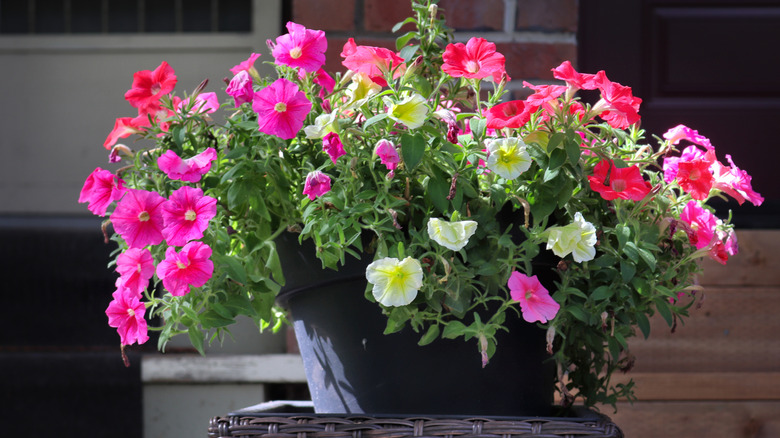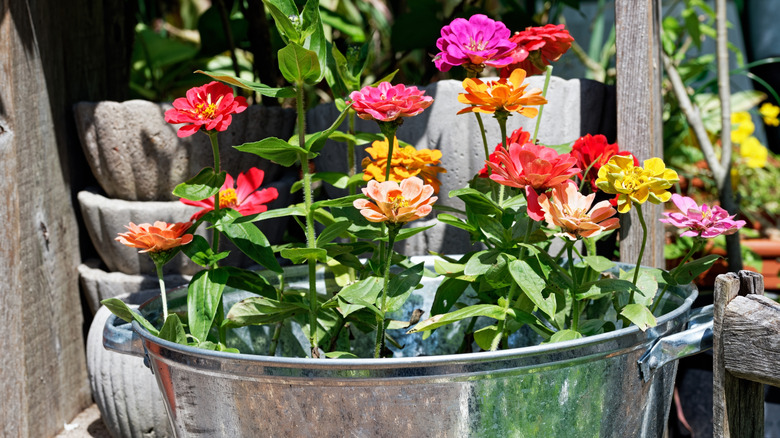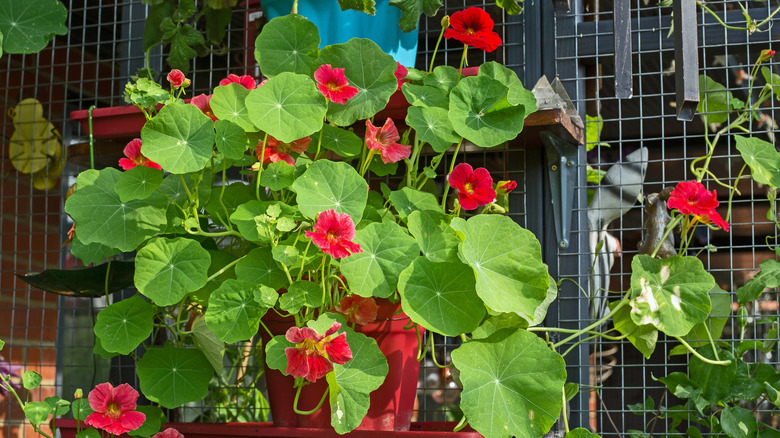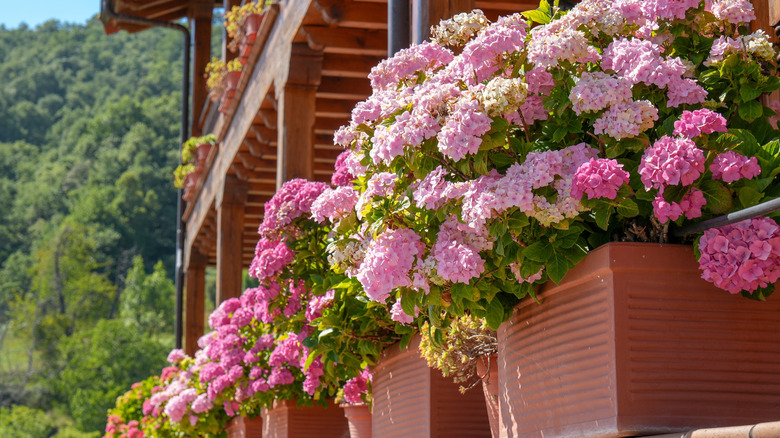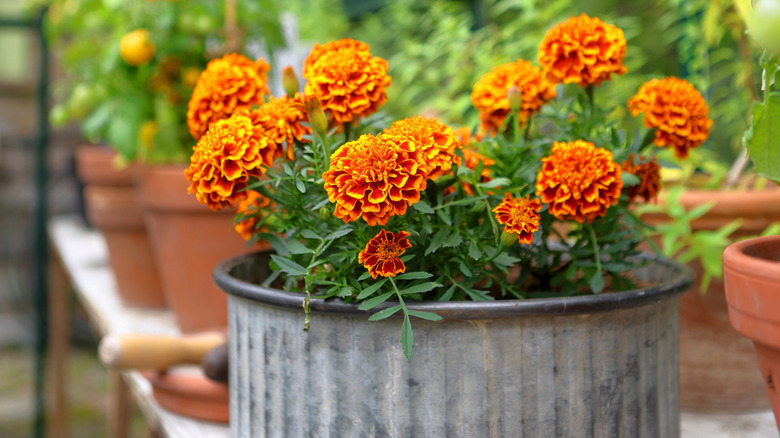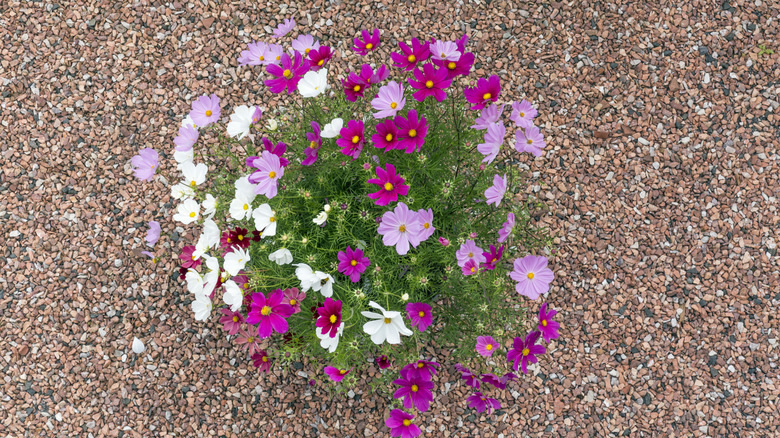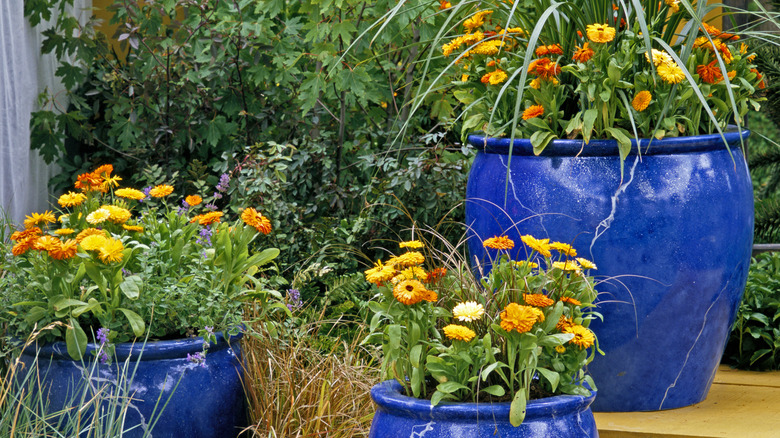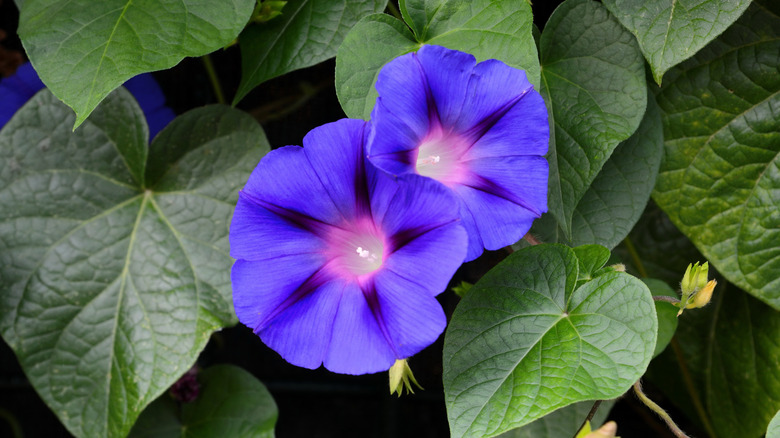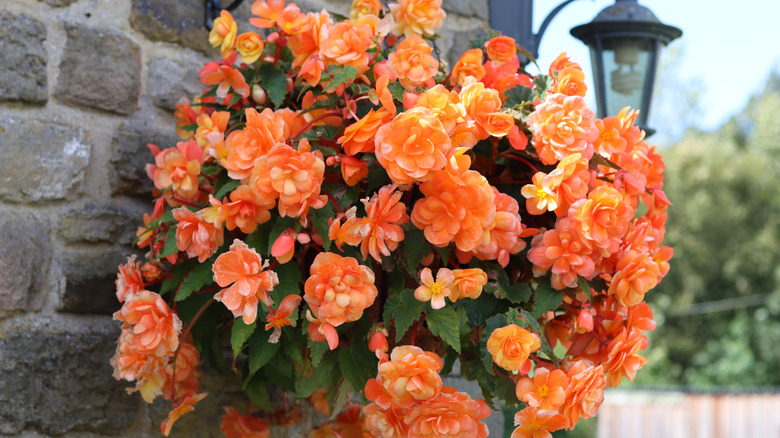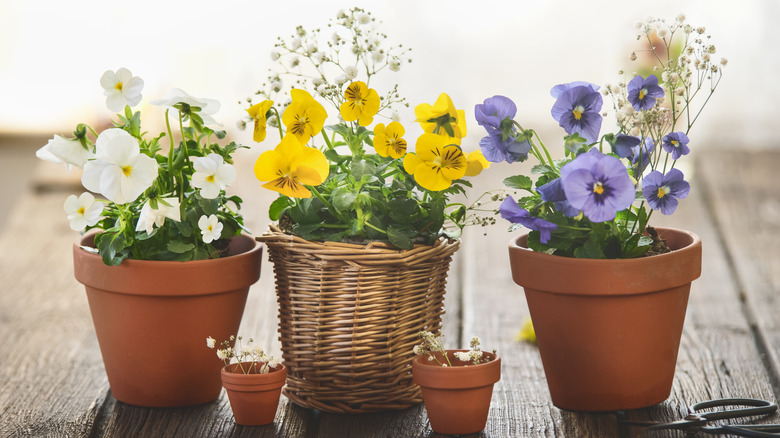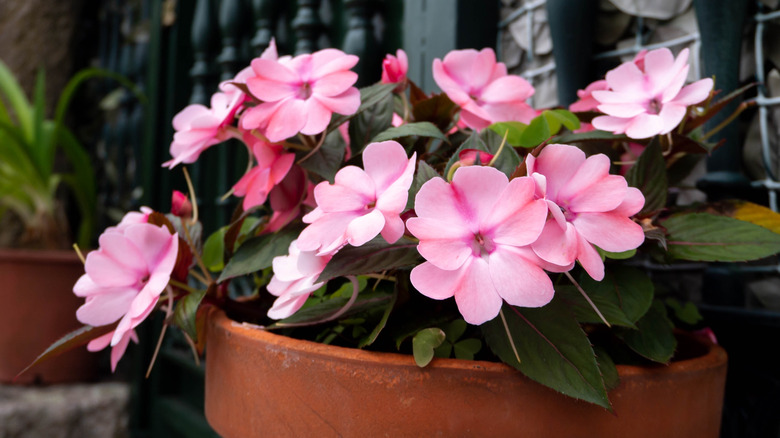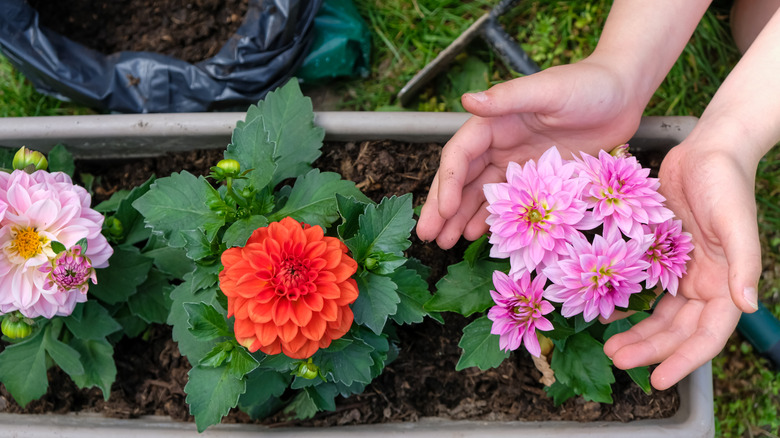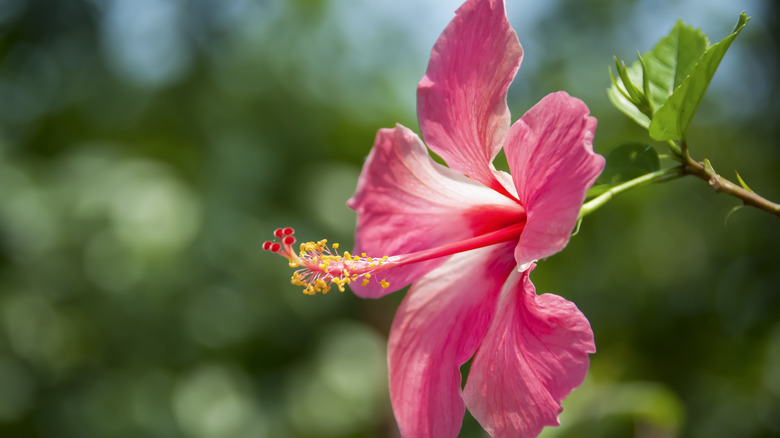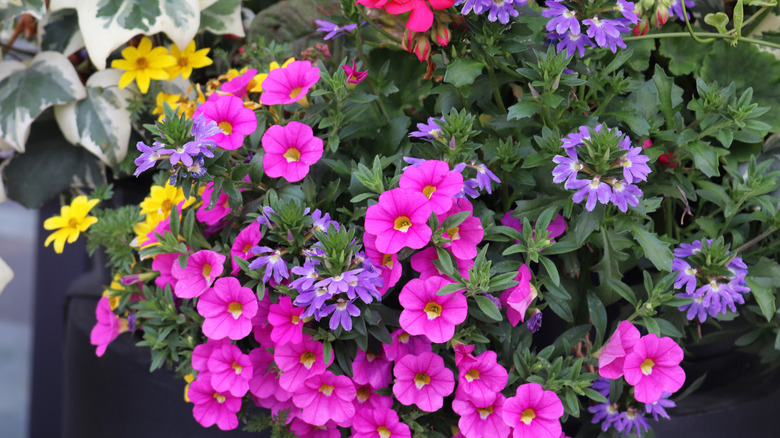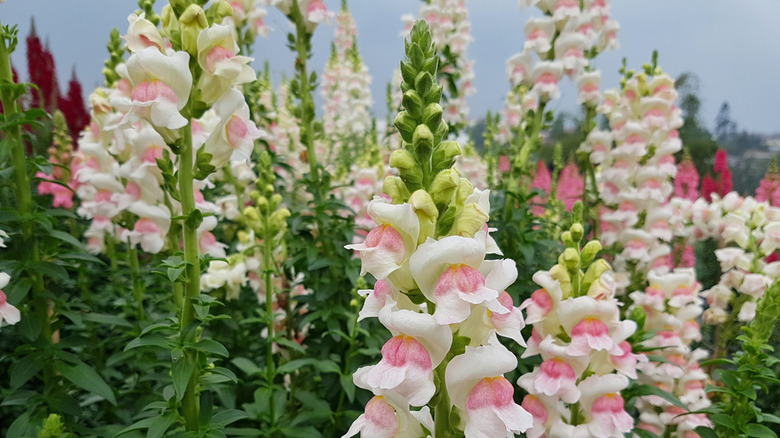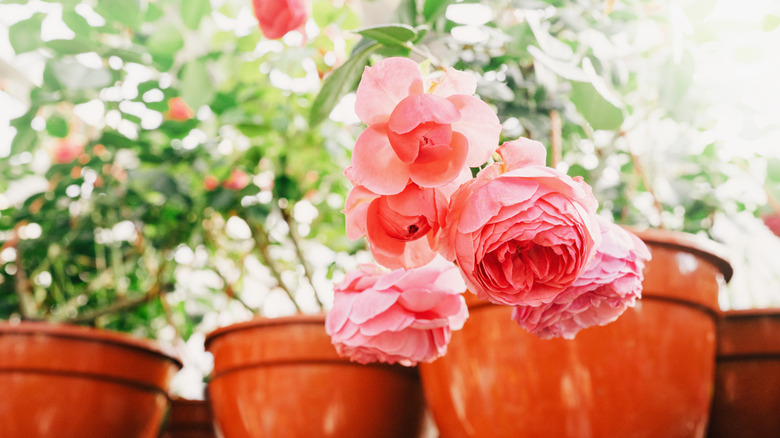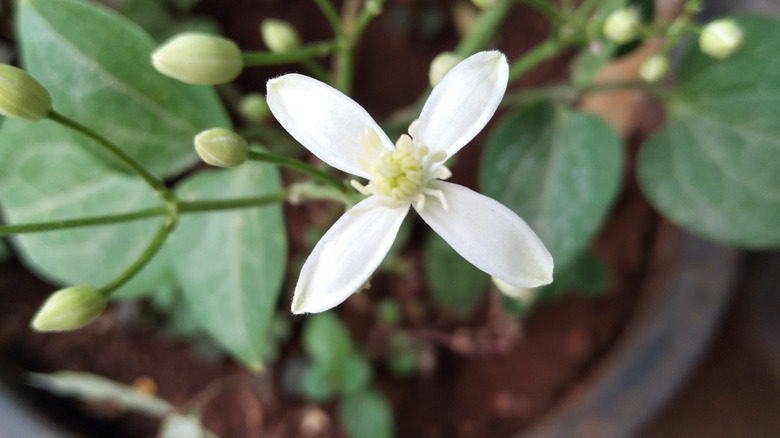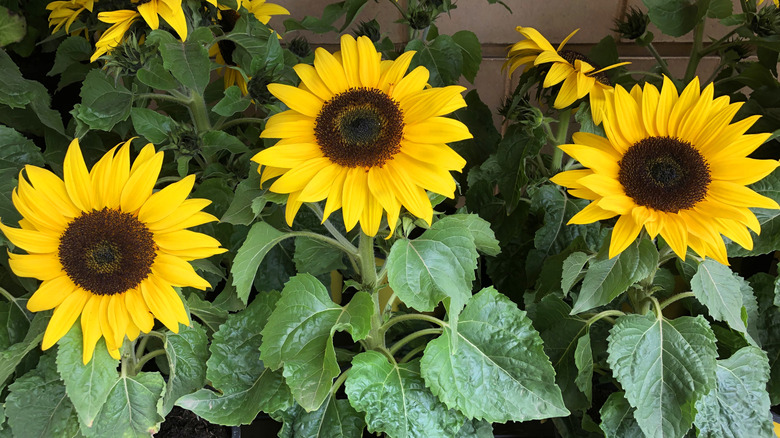20 Fast-Growing Flowers That Bring Color To A Container Garden
Few things can beat fresh flowers livening up your home's exterior with fragrant aromas and attractive blooms. If you don't have ample amounts of yard space to accommodate raised garden beds or rows of plots for planting, a container garden can be a practical and rewarding alternative. Planting in containers also offers more flexibility, as you can easily move the plants around until you find an ideal spot that matches the plant's specific needs. Additionally, this approach provides an extra layer of protection from pests, diseases, and the elements. Stepping onto a porch or patio and being surrounded by a sea of colorful blossoms can leave a lasting impression and increase your home's curb appeal, but it can take some time and effort to reap the rewards of the striking ambiance. Luckily, with proper planning, you can opt for fast-growing varieties of flowers that thrive in container gardens with very little fuss.
Compact flower varieties are usually considered to be the best fit to grow in pots or containers, but often they can have slow growth habits that prevent them from rapidly outgrowing their homes. However, not all varieties that do well in container environments are slow growers, and you can find bold and beautiful blooming plants that grow generously in pots throughout the seasons. By choosing to grow flowers that bloom more frequently and abundantly, you save yourself the time and impatience of sitting around waiting months for your plants to establish and reflect the vision you have for an at-home oasis. Here are some of the best fast-growing flowers for a colorful garden in no time.
Garden verbena
One fast-growing flower that thrives in a container garden environment is garden verbena (Verbena x hybrida). Verbenas come in a wide variety of colors, with blooms that are both long-lasting and tolerant to heat, making them the perfect addition to your summer garden. Garden verbenas are drought-tolerant, which works well for container gardens since they typically drain more quickly than garden beds and can become dry without consistent watering. These bountiful, warm-weather plants grow best in USDA hardiness zones 9 to 10. They need well-draining soil and ample amounts of sunlight to be happy and healthy.
Cornflower
Cornflowers (Centaurea cyanus) boast delicate, colorful blooms that stay vibrant even after being cut. These low-maintenance plants grow exceptionally fast, even in container gardens, and can be frequently harvested to keep your home stocked with perpetual bundles of fresh-cut flowers. One perk to growing these annuals in your container garden is that they are tolerant of a wide range of climates and grow hardy in USDA zones 2 through 11. Growing cornflowers in pots can also bring more pollinators into your yard and garden, like bees, butterflies, and hummingbirds, which can encourage biodiversity and minimize pest populations.
Petunia
The trailing vines and rapid growing habits of petunias (Petunia x hybrida) make them the perfect spiller plant for a hanging basket or container garden. Petunias are both heat and drought-tolerant, so they're a good match for pots and containers, which have a tendency to dry out if you miss a watering. The world of petunia colors is vast and versatile, and you can find varieties that come in shades of white, purple, pink, yellow, red, and even black. The flower grows best in well-drained, fertile soil in USDA zones 10 to 11 and can tolerate both full sunlight and partial shade.
Zinnia
Another fast-growing option that's well suited for bringing vibrant colors to your backyard container garden is zinnias (Zinnia elegans). These plants can flower in as little as a couple of months and are compatible with a wide variety of environments. The annual flower can grow well in USDA zones 10 to 11 with adequate watering, plenty of direct sunlight, and a moderate amount of care. You can find varieties of zinnias that come in multiple shades to broaden the color palette of your yard, all in one pot or container, like warm orange hues reminiscent of a sunset or rosy pinks.
Garden nasturtium
Another flower that grows abundantly and is well-suited for life in a container is the garden nasturtium (Tropaeolum majus). This flexible flower is known for its fragrant aromas and colorful petals, which range anywhere from sunny yellow to deep red in hue. This low-maintenance plant is very forgiving and can thrive even in poor conditions, but with adequate care, nasturtium is an exceptionally fast grower and a good match for beginner gardeners. While the flowers are capable of handling a bit of neglect, the annual plant does require full exposure to the sun and grows best in USDA hardiness zones 2 through 11.
Hydrangea
A hydrangea plant is another great option for growing in pots or containers for fast and abundant blooms, especially compact varieties. Smooth hydrangeas (Hydrangea arborescens), bigleaf hydrangeas (Hydrangea macrophylla), and mountain hydrangeas (Hydrangea serrata) are all suitable varieties to grow in a container garden and are still capable of growing dense, colorful blooms despite their compact growing habits. The best climates for bountiful hydrangea plants are USDA hardiness zones 5 through 9, where the flowers can grow abundantly in damp, well-draining soil. Hydrangeas do require ample amounts of full sun to reach their full potential.
Marigold
Marigolds (Tagetes sp.) are an iconic flower that practically needs no introduction. The plant has grown more and more popular with home gardeners thanks to its ability to produce fast and frequent blooms that are picturesque and vibrant. French marigolds (Tagetes patula) are a particularly attractive option for container gardens since they're one of the more compact varieties, but will still grow bountifully, even in smaller spaces. French marigolds blossom with striking red and yellow petals all through the summer and fall. They can tolerate a wide variety of climates and can successfully be grown as annuals in USDA hardiness zones 2 through 11.
Garden cosmos
If you're looking for delicate blooms that grow elegantly with ease, look no further than garden cosmos (Cosmos bipinnatus). This charming flower is famous for its pink blossoms that grow generously and require very little care. Cosmos are annual flowers that bloom freely during warmer months in USDA hardiness zones 2 through 11. The plant is versatile and adapts well to different climates, making it an excellent choice for container gardens. To grow healthy and strong, cosmos need a pot that's deep enough to accommodate their root system, moderate amounts of watering, and plenty of full sunlight.
Calendula
Calendulas (Calendula officinalis) are sure to stand out in your yard or garden, thanks to their uplifting golden petals. This flower is a common pick for container gardens since it's straightforward to grow and requires exceptional drainage. Calendula plants grow so well in container-like environments, they've even earned the nickname "pot marigolds." The annual plant can tolerate either full or partial sun and is capable of blooming in the spring, summer, and fall. You can successfully grow calendula plants in USDA hardiness zones 2 to 11 in a pot of neutral, well-drained soil.
Morning glory
The rich, radiant hues of the morning glory (Ipomoea purpurea) plant are hard to miss. Standing out in a garden is no difficult feat for the flower that boasts distinct purple and blue petals from early summer to late fall. One of the best qualities of the morning glory is its ability to grow fast and abundantly, achieving up to fifteen feet of growth per season. The annual plant can also grow nearly anywhere in the country and thrive in USDA hardiness zones 2 through 11 in full sun.
Begonia
Begonia flowers are another excellent option for livening up a container garden that grows quickly and bountifully. There are thousands of different begonia varieties, but tuberous begonias (Begonia x tuberhybrida) do particularly well when grown in container gardens. Tuberous begonias prefer warmer climates and thrive in USDA hardiness zones 9 to 11, but the advantage to growing them in pots is that when temperatures drop, you can easily transport them indoors to protect them from the elements or frost damage. Begonias bloom brilliantly during the spring and summer and love shady spots around the yard.
Pansies
You can find pansies (Viola x wittrockiana) in shades of pink, yellow, white, and violet. The dainty, intriguing flower can liven up your garden with multicolored petals that add depth and liveliness to your yard. Not only are pansies beautiful, but they're considered fast growers and are incredibly easy to cultivate at home. Pansies grow best in USDA hardiness zones 7 through 11 and can bloom in the spring, summer, or fall. Pansies are a good fit for container gardens since they're compact and don't like to be overwatered. Grow them in partial shade to avoid damage from too much sun.
Garden balsam
Garden balsam (Impatiens balsamina) flowers are fragrant and eye-catching and will continue to generously bloom for as long as the season allows. Garden balsam plants are unique because of their ability to thrive in shady areas that don't get direct sunlight. Planting them in a container garden gives you the advantage of being able to transport the pot to a shadier area if they seem to be getting too much sun. Garden balsam is adaptable to various conditions and can be grown as an annual in USDA hardiness zones 2 through 11.
Dahlia
Dahlia flowers need no introduction. The whimsical petal structure and striking color variations of dahlias make them a popular choice for both beginner and expert gardeners. Dahlias have a reputation for growing impressively quickly and can expand your garden's color palette with relative ease. Since adequate drainage is critical to a healthy dahlia plant's growth, growing them in pots or containers with drainage holes can be very beneficial to the flower. Most varieties of dahlias bloom through summer and fall, and grow best in USDA zones 8 to 10, where they get plenty of direct sun.
Hibiscus
Hibiscus plants are another fast-growing container plant that will also entice pollinators to visit your yard or garden. There are many different types of hibiscus plants out there, but tropical varieties like Hawaiian hibiscus (Hibiscus rosa-sinensis) tend to have more compact growing habits, making them a perfect match for container gardens. Hibiscus plants are extremely recognizable, thanks to their distinctive and eye-catching petals that come in a variety of bold colors. You can even find multi-toned hibiscus varieties that boast multiple hues. Tropical hibiscus plants love humid, warm, sunny climates and grow best in USDA hardiness zones 9 to 11.
Million Bells
Million bells (Calibrachoa x hybrida) can produce dense and frequent bundles of blooms for months at a time, creating a unique and captivating display in your home garden. These plants grow beautifully in container gardens, particularly in hanging baskets where the trailing flowers can elegantly spill over the edge. To get the most out of your million bells plant, you'll need to ensure it receives ample amounts of sunlight, consistent watering, and is planted in fertile soil that's well-draining. This brilliant and easy-going flower can be grown as a perennial in USDA hardiness zones 9 through 11.
Snapdragon
Snapdragons (Antirrhinum majus) are a great choice for container gardens that are limited in space due to their vertical growth habits. Snapdragons' flowers can grow very tall, very quickly, especially in cooler climates where the plant grows best. You can find snapdragons in a myriad of rich colors that make a statement. The unique structure of the flower's delicate petals and eccentric appearance is sure to draw the attention of anyone who passes through your home's garden. They can tolerate both full and partial amounts of sunlight and grow hardy in USDA zones 7 to 11.
Rose
When you think of roses (Rosa sp.), you might picture the iconic flowers growing abundantly on a bush, but roses can also grow strong in pots or containers in the right conditions. During warm summer months, rose plants are capable of incredible growth, yielding multiple harvests of elegant bouquets for the season's entirety. From soft, blushing pinks to deep, dramatic reds, you can grow roses in dozens of hues that will add a touch of charm and an air of romance to your garden. You can find specific varieties of roses that will grow in almost any USDA hardiness zone.
Honeysuckle
Honeysuckle (Lonicera periclymenum) is a popular choice with gardeners thanks to its sweet, aromatic nectar, which can fill a garden with its welcoming fragrance. This vining plant can grow rapidly during the summer months and boasts trailing vines that produce an abundance of delicate flowers. Plenty of varieties of honeysuckle are well-suited for growing in pots or containers, and since the plant can experience frequent growth, keeping it in a smaller vessel can prevent it from becoming overgrown. Common honeysuckle plants grow best in USDA hardiness zones 4 through 9 and are even capable of blooming all year in certain regions.
Sunflower
Finally, the sunflower (Helianthus annuus) is another stunning plant that will thrive in containers in full sun. Smaller, dwarf varieties of sunflowers are particularly good matches for growing in a pot on your porch or patio, and with adequate care and an abundance of sunlight, sunflowers are known to grow relatively quickly. Most of us are familiar with the sunflower's cheerful blooms with sunny yellow petals that can turn almost any atmosphere into a joyful one. Sunflower plants prefer warmer climates, which is unsurprising given the flower's name. You can successfully grow them as annuals in USDA hardiness zones 2 to 11.
